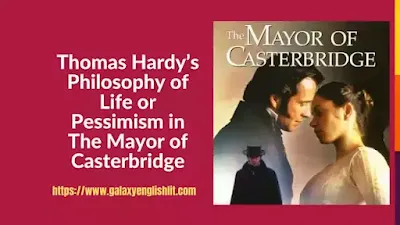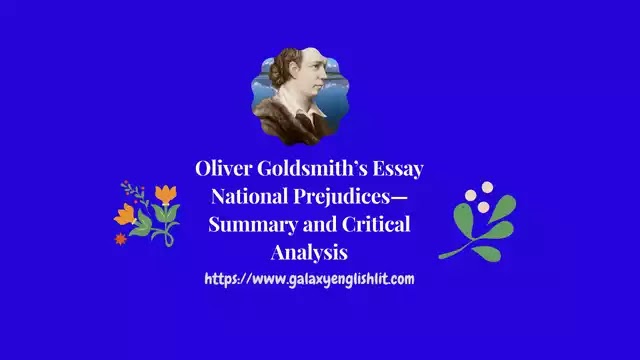Hardy not a Philosopher but a Novelist and a Literary Artist:
Hardy is not a philosopher. It is unreasonable to call him a pessimist. He is a novelist. As a literary artist, it is his duty to present realistic picture of human life. He is a keen observer of human life. It has been his experience that none is perfectly happy in the world. Therefore his novels present a dark picture of human life. He firmly believes that a numbers of factors work against human happiness.
 |
| Thomas Hardy’s Philosophy of Life or Pessimism in The Mayor of Casterbridge |
Hardy's Drawing Gloomy Picture of Human Life:
Hardy does not deal with the brighter aspect of human life. His novels tell tales of human sufferings. In The Mayor of Casterbridge, Hardy draws a gloomy picture of Henchard's life. He struggles throughout his life yet suffers miserably. Just for a short period, he enjoys the bright sun shine. Rest of his life is lost in utter darkness of misfortunes.
Role of Chance, Fate and Destiny:
According to Hardy chance and fate work effectively in human life. Destiny dominates the character. All happen by chance. Irony of fate turns all very fast and a boon becomes a curse. As it happens with Henchard, he thinks Farfrae's stay at Casterbridge is a blessing but later on it becomes a curse for him. For Farfrae wins his trade, reputation, mistress and even daughter. He is completely ruined. Thus a man is like a puppet in the hands of these forces. By chance wine is sold in the camp of furmity. By chance Henchard drinks in excess and hearing trader's talk, decides to sell his wife. By chance a sailor pays five shillings and buys his wife. It is irony of fate that in spite of all efforts Henchard does not find his wife for the sailor has left the country. How destiny becomes character is quite clearly exhibited in the novel. Henchard decides to live at Casterbridge Destiny favours and he becomes the richest person of the town. He is elected the Mayor of the town. But when destiny goes against him, his business is ruined and he is reduced to the state of beggary. He leaves the town in the same condition in which one day he had entered it.
Nature's Playing a Vital Role in Shaping the Lives of Human Beings:
Hardy rather discovers that nature in unconscious, unjust and blind. It can offer no healing balm to a man in misery. Hardy believes that nature is an agent of Evolutionary Force and works by the cruel means of struggle or existence and survival of the fittest. Those who best adapt themselves to Nature, will survive and those who cannot do it , will suffer in life . On the day of rejoicings in celebration of a national event, Henchard organizes his function in the open field. In the afternoon, the day becomes stormy and rainy and Henchard's arrangements are so much disturbed that the crowd leaves his tent and gathers at Farfrae's because Farfrae organizes his show in a sheltered place unaffected by storm and rain. Thus it is Farfrae's foresight and intelligence that teaches him how to save from the vagary of weather. Nature is also a living character. It seems to act against Henchard and help Farfrae. In the month of June, the weather was very favourable. On the basis of forecast made by the weather - prophet, Henchard made heavy purchases thinking that the prices of corn would double due to bad weather. The weather changed all of a sudden and a rich harvest was almost a certainty. As a consequence, prices rushed down. There was three days of excellent weather. Farfrae went on buying old corn at a ridiculous price; Henchard could not hold back his stock because of shortage of money. Thus nature deceives Henchard.
Role of Society and Religion:
In Hardy's world, people suffer on account of the imperfection of society and religion. These institutions are formed to protect and help the poor, weak and distressed people. But it seems that they have no kind, human and sympathetic attitude towards the tortured people. The pathetic cry of the suffering people is suppressed due to orthodox customs and beliefs. Society, instead of inclining towards the poor and weak, favours the strong and rich people. When Henchard sells his wife and daughter for five shillings, society does not come forward to help Susan and she is sold. When she comes back after eighteen years, Henchard has to wait to marry her again due to occupying a high position in the society. When Henchard is rich, the whole Casterbridge honours him but when he becomes poor, nobody comes to know even of his death. The social convention which demands that a woman should have had no love - affair with anybody before her marriage makes Lucetta terribly afraid of the consequences of this exposure.
Role of Love and Marriage:
Hardy deals with the problems of marriage and love in two of his novels Tess of the D’Urbervilles and Jude the Obscure. In Hardy's view love at first sight does not help very much in making life happy. Marriages that are the result of love at first sight generally end in unhappiness. Marriages should be performed after matured consideration. The two people should study and understand each other before they rush into marriage. In The Mayor of Casterbridge, Hardy puts a view point in the conversation that takes place between Susan and Henchard. “The conversation took a high turn, it often does on such occasions. The ruin of good men by bad wives, and more particularly, the frustrating of many a promising youth's high aims and hopes and the extinction of this energies, by an early imprudent marriage was the theme.” Henchard suffers due to his marriage with Susan . He suffers because of his love for Lucetta and Elizabeth. His affection for Farfrae grieves him throughout his life. Elizabeth rude behaviour at her wedding night shatters his heart and life.
Character is Destiny:
According to Hardy, man himself is responsible, to some extent, for his tragedy. The Mayor of Casterbridge confirms this view - point. Henchard himself is responsible for his sufferings. It is his mistake that he drinks too much in spite of his wife's protest and sells her and Elizabeth for five shillings. None else is responsible for his dispute with Farfrae. He never reconciles with Farfrae. Whenever he wishes to help, Henchard rejects. It is his rashness which creates so many problems for him. It is undoubtedly lack of worldly wisdom and temperate behaviour which is no less responsible for Henchard's tragedy. Thus he does not express a blind faith in destiny. The forces of fate and chance become active only when the primary mistake has already been done by the person concerned.
The Charge of Pessimism against Hardy:
Hardy's attitude towards life is undoubtedly pessimistic and gloomy. He holds out no hope for human beings. But his pessimism is not depressing for he exhorts us to struggle and fight against the decrees of fate and cruel destiny, rather than make a weak surrender to the majesty of the sinister and malignant power governing the universe. Hardy is of the view that it is man's lot to suffer and meet with defeat and dejection in his life, but in spite of the inevitable fate, man should strive and struggle and fight against circumstances. He should go down fighting in a brave and heroic spirit. In The Mayor of Casterbridge Henchard does not wish to live on Farfrae's mercy and leaves Casterbridge. When Henchard enters Casterbridge, he is a poor unemployed hay trusser. By working hard, he becomes the richest man of the town. He is elected the Mayor of Casterbridge. Susan in spite of hardships and miseries of the middle life enjoys herself in the last days on her life. Henchard brings her home with due respect. Susan thus dies with great satisfaction.
Not a Cynic:
However, Hardy is certainly not a cynic. There are, no doubt, villains in his novels. But, on the whole, his view of human nature is healthy and favourable. He does not look upon human nature as mean of sordid or degraded. Human nature is essentially good and noble. For all his weaknesses and failings, Henchard strikes us as a splendid man. Hardy is right in describing him as a ‘man of character’. Even Farfrae is a well - meaning and generous man in spite of his commercial attitude towards life. There nothing really ungentlemanly about Farfrae even though he does a wrong in transferring his love from Elizabeth Jane to Lucetta. The other characters in the novel, with the only exception of persons like Jopp and the skimmity - riders, are also good folk.
The Cathartic Effect:
The tragic Protagonist in The Mayor of Casterbridge really wins our deepest sympathies in spite of his faults and shortcomings. He wins our sympathy when he becomes a bankrupt; he wins our sympathy when he loses Lucetta; he wins our sympathy when, after several years of prosperity, he is again reduced to the humble position of a hay - trusser working under a man who was once his employee; he wins our sympathy when he leaves Casterbridge; finally he wins our sympathy when he is shabbily treated by Elizabeth Jane on her wedding day.





